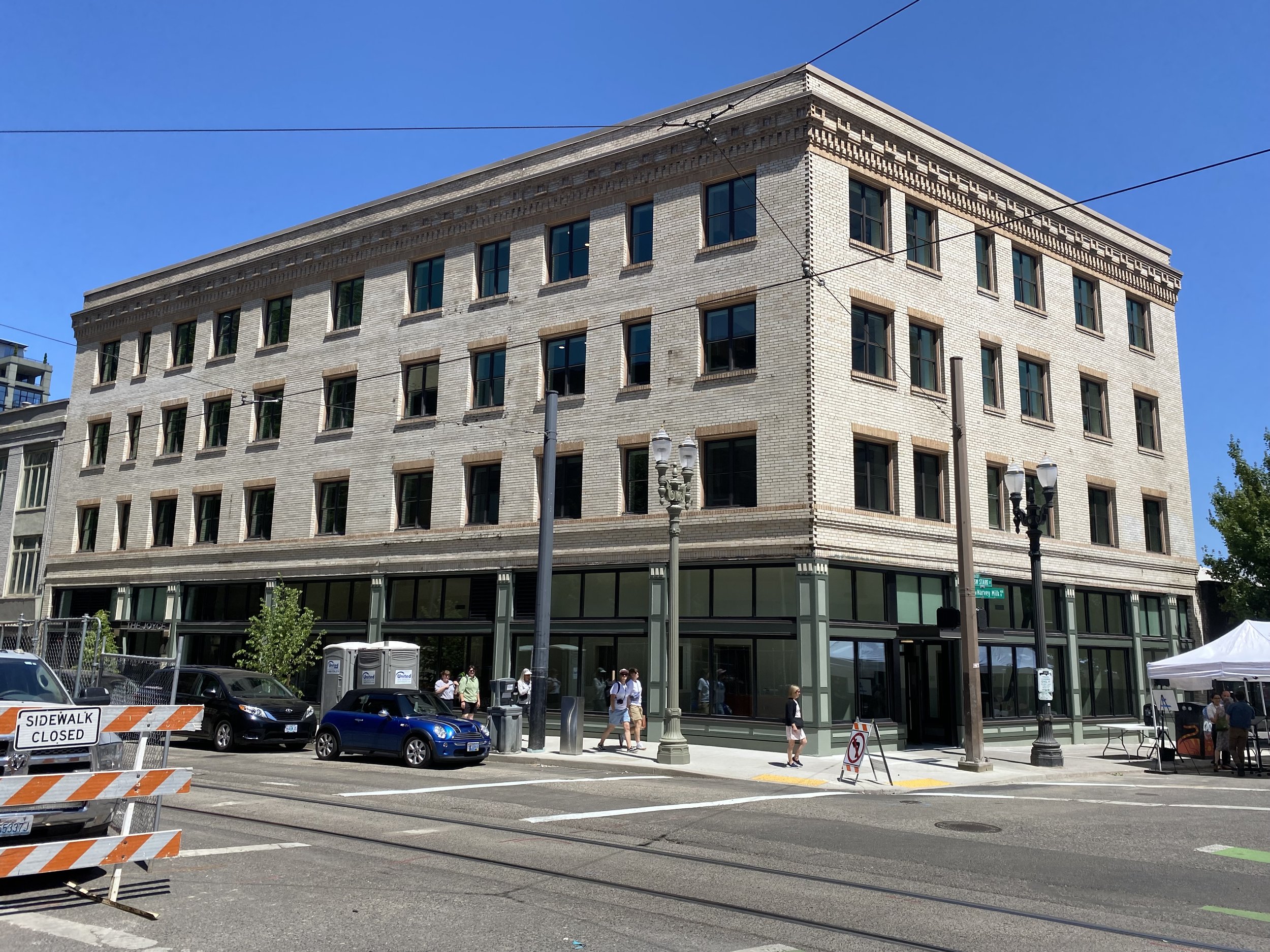The Joyce Opens in Downtown Portland to Provide Permanent Supportive Housing for People Exiting Homelessness
Event speakers, including PHB Interim Director Molly Rogers, OHCS Executive Director Andrea Bell, Multnomah County Chair Jessica Vega Pedersen, HUD's Bryan Guiney, Home Forward's Ian Davie, and CPAH's Rachael Duke, JiIlian Saurage Felton, and Rachel Loftin, cut the ribbon at the Joyce.
The Joyce celebrated its grand opening in Downtown Portland yesterday, offering people exiting homelessness a chance to heal, rebuild their lives, and recover from the trauma of living outside.
The project, which received funding from Portland’s Housing Bond, is the eleventh Portland Bond project to open its doors since voters passed the city’s first bond measure for affordable housing in 2016. Community Partners for Affordable Housing (CPAH) was selected as the project developer in 2019, with a vision of combining services and housing affordable to very low-income individuals exiting homelessness.
For decades, the Joyce, located at the corner of SW 11th Ave and Harvey Milk Street, served as a short-stay hotel, providing low-cost, low-barrier housing to some of the city’s most vulnerable residents. The newly renovated Joyce now provides 66 efficiently designed, affordable single room occupancy units to house individuals and couples exiting homelessness. In partnership with Cascadia Health, Native American Rehabilitation Association (NARA NW), and Cascade AIDS Project, on-site supportive services offered to residents will include care coordination, crisis intervention, housing stabilization support, and wellness activities. All 66 units have Project Based Section 8 vouchers so that the project can continue to serve extremely low-income residents.
“We know that housing is essential for services to be successful, and it provides the foundation people need, not just to survive, but to heal, thrive, and move forward. It is hard work, rebuilding lives, so we want to give our residents all the tools they need to do that work,” said Rachael Duke, CPAH’s Executive Director. “CPAH is grateful for the partnerships we have that will provide the breadth of services necessary for residents.”
CPAH also worked with Carleton Hart Architecture to create a trauma-informed design that includes elements of biophilia. This combination provides a sense of healing and calmness in residents to help bring them out of a fight or flight response. Examples of biophilia in the project come from the use of natural materials, calming earth-toned paint colors, use of natural light, and connections to the outdoors.
“The City of Portland is proud to support the redevelopment of the Joyce, which has long served this city as a haven for people who otherwise would land on the street. Preserving this community asset so that it can continue to serve the same vulnerable population—close to services, transportation, and opportunities—is a critical piece of our commitment to ending homelessness in our city,” said Portland City Commissioner Carmen Rubio. “Thanks to Portland’s Housing Bond, the Joyce will provide safe, stable, permanent homes and critical mental health supports so that our formerly houseless neighbors can live with the peace and dignity everyone deserves.”
The Joyce is part of a quartet of historic buildings built between 1908 and 1912 that complement each other in scale, material, and detailing. Beyond the elegance of early 20th century architecture, this intersection provides the city with a unique time stamp of our past. The renovation of the Joyce, which included a seismic retrofit, is an investment in Portland's future while saving its past. The service providers also reflect the history and the people who previously found their home at The Joyce when it was a hotel. CPAH is honored to continue serving the LGBTQ+ culture and indigenous communities in Portland, and to have the opportunity to uplift the legacy of all the people who have called the Joyce home.
“Today, we celebrate not only the grand opening of a beautiful new building, we also celebrate what is possible when we come together as a community to solve our toughest challenges. I want to thank CPAH for their tireless commitment to keeping the original mission of the Joyce alive and well for future residents in need of low-barrier housing,” said Portland Housing Bureau Interim Director Molly Rogers. “To the voters of Portland, who were a critical part of this milestone as well, we are proud to say we are delivering on our promises for Portland’s Housing Bond: Where we promised 1,300 permanently affordable units, we now have 1,859 open or in progress throughout the city; Where we committed to creating 300 units of permanent supportive housing, we have 399 open or in progress; Where we said we’d create 600 units of very low-income housing at 30% AMI or below, we now have 774.”


